CIA Sponsored Terror, Civil Liberties, Criminalizing Dissent, FBI Intrusion, Habeas Corpus, Human Rights, Political Prisoner, Prison Industry, Surveillance, Targeting Muslims, Truth to Power
Podcast: Play in new window | Download
Updates:
- Hosts Discuss Mass Demonstrations In Wake Of Ferguson Grand Jury Verdict
—-
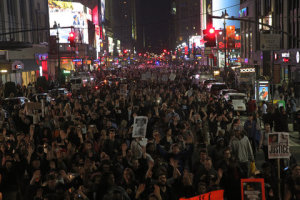

Mumia Abu Jamal Responds To Grand Jury Not Indicting Ferguson Police Officer Darren Wilson
We talk today about the wide scale pattern of police violence against people of color in the context of the grand jury decision in St. Louis, Missouri to not indict Ferguson police officer Darren Wilson for the fatal shooting of Michael Brown, an unarmed 18 year old African American. The decision sparked more outrage within the community of Ferguson and launched tens of thousands into the streets in cities across the country. The grand jury is comprised of 12 members and 10 out of the 12 would have to agree to indict. The grand jury had a number of choices, such as first degree murder, second degree murder, voluntary manslaughter or involuntary manslaughter. First degree murder would have required evidence that Wilson set out to kill Brown. Second degree murder charges were possible, but this choice was unlikely if jurors decided that Wilson was negligent when he shot Brown, they could have gone with a charge of voluntary or involuntary manslaughter.
Mumia Abu Jamal:
- When you think back through American history, there are actually few periods where you see this range of protest.
- You’ll see throughout the 20th century protest. Think about April 4, 1968, the day Martin Luther King Jr. was killed and you saw protests all across the country over hundred cities.
- And look what happened a few hours ago, perhaps a greater range of protest in over 170 cities tells you I think better than anything I can say, that things are very bad indeed for the African American community and their expectation of justice in this system.
- Think about the weather, people coming out in the dire cold, right, to protest at night. That’s not an easy thing, people don’t do that easily and they do it at considerable risk and some danger.
- That speaks to the depth of the feeling in their hearts that something is broken in the American justice system.
- The recent midterm election was the lowest turnout since the 1940s. That says something about American discontent with the political system.
- It actually reminds me about the demonstrations before the 2003 Iraq War, where all around the world in hundreds of countries you saw demonstrations that were unprecedented.
- People feel that. Now that can dissipate until a new provocation.
- This is the time where organizers should be on their p’s and q’s and out there taking phone numbers and taking emails and building lists.
- To stand up at this moment, the first African American president in America’s history and talk about that people need to observe and respect the rule of law is I think frankly absurd.
- Barack Hussein Obama was born August 4, 1961. In that year there were about 20 states that made it illegal for a white person to marry a black person.
- People went to jail for what they called interracial fornication.
- When you talk about the rule of law, you have to talk about the rule of right and the rule of wrong.
- To quote John Africa, who said just cause its legal don’t make it right.
- We live in a country that legalized slavery.
- Many things are done in the name of law, but they’re wrong, they’re simply wrong.
- I was reading in the USA Today last week, (I’m little behind in my reading) they said 461 people were killed by police in 2013.
- This is something that’s systemic in the United States, and the people are trying to draw attention and I don’t think its successful, but its a damn good beginning.
Guest – Mumia Abu-Jamal is a renowned journalist from Philadelphia who has been in prison since 1981 and was on death row since 1983 for allegedly shooting Philadelphia police officer Daniel Faulkner. After decades of appeals, he left death row in 2012 but is still facing a life sentence. He is known as the “Voice of the Voiceless” for his award-winning reporting on police/state violence brutality and other social and racial epidemics that plague communities of color in Philadelphia and throughout the world.
—-


Civil Forfeiture: Federal Government Seizes Property Of Business Owners
In May of 2013, two Internal Revenue Service agents seized the checking account of Carole Hinders and the 32 thousand dollar balance. Hinders was accuses of structuring her deposits to be less than 10 thousand dollars to avoid filing required government reports. This is a tactic often used by drug dealers and other criminals to move money around without detection. However, Carl Hinders owns a Mexican restaurant and her business is cash only. She did explain to the IRS agents that she made deposits almost daily to avoid having thousands of cash on hand. Hinders wasn’t charged with a crime, yet the IRS still seized the money. There are many cases of civil forfeiture similar to Carol’s where the property is taken without proper due process and investigation.
Attorney Larry Salzman:
- Civil forfeiture is a set of laws that allow government agencies to take your property when they suspect its been involved in crime but they don’t need to charge you with any crime to take that property.
- One of the incredible things about civil forfeiture is that the agencies that seize your money based on a mere suspicion actually get to keep that money to fund their agencies.
- That’s true in most states and also for the federal law.
- Every state is engaged in civil forfeiture. Minnesota had a reform. They no longer use strictly civil forfeiture, they’ll only take your property after you’ve been convicted of a criminal offense.
- The federal government uses it (civil forfeiture) almost every major agency of the federal government, the Drug Enforcement Administration, the IRS, the DHS, ICE.
- You can’t have both civil forfeiture and an impartial enforcement of the law if the agencies enforcing that law get the money.
- In federal cases there’s another lack of due process. The federal agencies seize cash like a bank account, the law doesn’t provide any prompt post seizure hearings. So, there’s no right for you to quickly contest the validity of the seizure. You might wait a hear without your money before you get to see a judge.
- It’s very hard to get it back because it means mounting a full scale defense in state or federal court against well funded prosecutors.
- There’s that financial incentive, so the government is doing more and more of these civil forfeitures as their budgets are coming under constraint.
- If local law enforcement involves themselves in a federal forfeiture action, they’ll get paid a bounty by the feds for their participation. That becomes a very meaningful part of police department budgets.
- That equitable sharing program has ballooned from nothing to something over 450 million dollars a year given to local police departments.
- We’re seeing it again with another set of clients. We have 3 brothers who own a convenient store distribution business on Long Island, the IRS again took 446 thousand dollars from them.
- This is a modest business almost all of that money was money that was owed to vendors for inventory. They grabbed their bank account when it was its fullest basically. The allegation again was structuring.
- There’s not even a civil forfeiture action that’s been filed, that’s a violation of law in itself the government’s committed.
- Many of the worst aspects of civil forfeiture were ushered in on the premise that they were needed to combat drug trafficking but now we see civil forfeiture being used to treat legitimate small businesses like criminals, just because they’re making frequent cash deposits.
Guest – Attorney Larry Salzman is with the Institute for Justice. He joined the Institute in April 2011 and litigates cutting-edge constitutional cases protecting individual rights, including free speech, property rights, and economic liberties, in federal and state courts. He is originally from San Diego. His commitment to both entrepreneurship and law is reflected in his career prior to joining IJ. Larry co-founded an ecommerce company with his family in 2000, while attending law school at night, and returned to the business for several years as CEO upon its sale in 2007. During the interim, he was an attorney with Pacific Legal Foundation, in Sacramento, California, litigating property rights cases in federal and state courts, and served as a clerk to Judge Bohdan A. Futey on the United States Court of Federal Claims. Larry received his law degree in 2002 from the University of San Diego, where he was Assistant Editor of the San Diego Law Review. He received an undergraduate degree in Finance from Arizona State University in 1993.
——————————————————————————————————————————–
Civil Liberties, Criminalizing Dissent, Gaza, Habeas Corpus, Human Rights, Military Tribunal, NSA Spying, Political Prisoner, Surveillance, Targeting Muslims, Truth to Power, War Resister
Podcast: Play in new window | Download
Updates:
- RE/MAX Cashes In On Israel’s Illegal Settlements – Code Pink Calls For RE/MAX Boycott Campaign
- US Senate Votes Down USA Freedom Act
- Michael Ratner: President Obama Doesn’t Need Legislation To Stop The NSA, He Can Simply Direct the NSA Not To Collect Meta-Data
—–
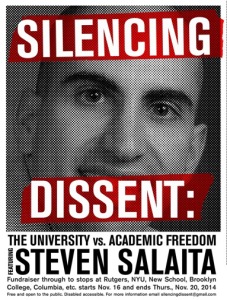
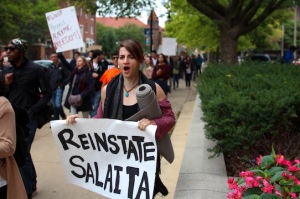
Academic Freedom Case Gains Traction
Since the University of Illinois at Urbana-Champaign Board of Trustees rejected Professor Steven Salaita’s candidacy for a tenured faculty appointment to the American Indian studies program, Salaita has been giving presentations about his case and the importance of academic freedom. Initially we reported here on Law and Disorder that Professor Salaita was un-hired from the American Indian Studies program at the University of Illinois at Urbana-Champaign because of his statements on social media criticizing Israel’s conduct of military operations in Gaza. Emails within the University revealed under Freedom of Information Act Requests show that it was outside pressure from donors that influenced the University of Illinois Chancellor’s decision to dehire Salaita.
Professor Salaita:
- My Dad grew up in Jordan, my Mom in Nicaragua. I grew up in West Virginia.
- I got my undergraduate and Master’s degree from a small regional college in south west Virginia called Radford University and I got my PhD in Native American Studies from the University of Oklahoma.
- My interest in Native American studies developed from a Native American novel course I took in college. It generated a profound interest in the histories of settlement and dispossession in North America which struck me as similar in important ways to the forms of dispossession that Palestinians have suffered in the Middle East.
- I submitted my application in October of 2012. I was offered the job in September of 2013. Signed the contract of October of 2013.
- The contract was countersigned by university officials and it was made formal. At that point it was announced that I had accepted the job.
- The process was nearly 2 years long from submission of the application to the signing of the contract.
- Any search process in the humanities or social sciences starts with a search committee of 4-6 people. They’ll look over a candidate’s cover letter. They’ll examine a candidate’s scholarship and they’ll examine that scholarship in detail.
- Once the search committee has made its selection it has to go to other committees throughout the university. A committee composed of representatives from the college. In my case the college of liberal arts and sciences.
- Because I was coming in with tenure I also had to be vetted by external referees, anywhere from 4 to 6. They basically read all of my scholarship. I had to send them all of my books, all of my scholarly articles, my teaching dossier.
- Given the statements that Israeli leaders have made, “mowing the lawn in Gaza”, “putting the people in Gaza on a diet” and their long standing discourse about demographic threats and a surplus of Palestinians . . . its hard not to think about those statements and debates when Israel carpet bombs an area twice the size of Washington DC land area that’s also home to 1.8 million people – you can’t help but think its a sort of violence informed by something worse than mere military strategy.
- A right-wing website run by (nominally) Tucker Carlson, the bow-tied gentleman formerly of Crossfire. He’s like he came out of a Republican lab. He wears a bow-tie his name is Tucker.
- His website the Daily Caller, ended up publishing a standard right wing hit piece. We’ve seen them all. Salaita, his tweets are horrible, blah, blah, blah, and by the way he’s going to start a job at the University of Illinois.
- Then the local rag in Urbana Champaign, the News Gazette picked up on the Daily Caller story and the controversy gained steam. The next thing I know I’m receiving an unceremonious termination letter from the chancellor.
- She said she didn’t expect trustee approval so there was no need to show up.
- They called me uncivil then it morphed into anti-semitic.
- Uncivil – – It’s a term that’s deeply rooted in colonial violence, that always implies something sinister without ever having to explain its intent or its meaning.
- It’s a wonderful term for shutting down debate. The entire southern hemisphere was colonized based on notions that they were uncivilized.
- The support has been phenomenal. Sixteen departments at the University of Illinois have voted no confidence in the chancellor and the board of trustees.
- I’ve also received support from the Center For Constitutional Rights, the Modern Language Association, a number of trade unions have passed resolutions condemning the university’s decision and demanding my reinstatement.
- The impulse seems to shut down the debate or discussion before it even begins.
- First of all we feel that its a matter of great import to the public interest that the university administration has arbitrarily taken an action that has had negative consequences for the reputation of the university and its ability to function normally.
- As you know the university is undergoing a boycott. It’s normal functions are being disrupted.
- Support Steven Salaita
Guest – Professor Steven Salaita, former associate professor of English at Virginia Tech. He is the author of six books and writes frequently about Arab Americans, Palestine, Indigenous Peoples, and decolonization. His current book project is entitled Images of Arabs and Muslims in the Age of Obama.Steven grew up in Bluefield, Virginia, to a mother from Nicaragua (by way of Palestine) and a father from Madaba, Jordan. Books by Salaita
—-

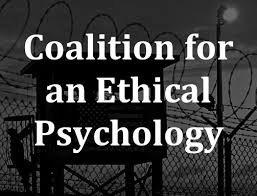
Independent Investigation of APA Ties with Torturers Under Bush Administration
The nation’s largest organization of psychologists is set to conduct an independent review into whether it colluded with or supported the government’s use of torture in the interrogation of prisoners during the Bush administration. In 2011 we reported on health professionals being front and center and complicit in the US policy of torture. The torturers relied heavily on medical opinion. Medical professionals provided sanitizing and rationalization for the infamous torture memos. During water boarding procedures, a doctor would be present. Psychologists were directly involved in the supervision, design and execution of torture at US military and intelligence facilities. This is a violation of state laws and professional ethics. These “health professionals” that were involved with torture still hold their professional licenses to practice.
Dr. Stephen Soldz:
- At this point I think we all know there was a program of torture in the Bush Administration. CIA and the DOD at Guantanamo. Less known was that psychologists were central to it.
- In the CIA, they designed the torture, they were also essential to the legal protection. The Justice Department torture memos basically said that if a health professional, a psychologist or physician is there and says that the interrogation won’t cause severe and long lasting mental harm, than it isn’t torture even if it causes harm.
- In other words, their presence was a get out of jail free card.
- As far as we can see it was central to the Bush Administration’s plans to indemnify themselves while engaging in torture.
- The American Psychological Association apparently worked with the Bush Administration to provide protection for the psychologists who were involved.
- The ethics code had been changed in such a way that it allowed psychologists to disobey the ethics code and follow governmental orders.
- This was actually done before 911 and passed after 911.
- We have been concerned if they (APA) had been complicit in various ways. James Risen from the New York Times just published his new book Pay Any Price and one chapter in there provided direct documentary evidence that APA officials were working with the CIA and the Whitehouse to manipulate the ethics code to apparently allow psychologists to participate.
- Michael Ratner: There was a committee appointed from the APA to look into the APA’s role as I recall . . . Dr Stephen Soldz: . . . to decide on whether psychologists participating in a national security interrogation was ethical – was consistent with the APA’s ethics code.
- They (APA) were not directly involved as far as we know in torture, they were more involved in doing what the CIA and the White House wanted in terms of manipulating ethical understandings.
- We, Amnesty and CCR have called for an independent investigation of the APA for a number of years. We’re glad the APA board has recognized the need.
- They appointed a Chicago attorney who is a specialist in public corruption. We are cautiously optimistic but we have some concerns.
- Its inappropriate for the APA board to appoint its own investigator of whether the APA did something wrong.
- The time frame they gave of 5 months is awfully short for an investigation of this magnitude. We’re hopeful that the investigation will be wide ranging and comprehensive which is what is needed.
- If the accusations in Risen’s book pan out, you have to look at his office (APA CEO) If he knew that means he approved of it. If he didn’t know that means he was incompetent.
- This has been the issue that has divided the APA in the last decade.
- What was most needed by the intelligence community was that it was ethical for the psychologist to participate in the interrogation.
- One of the key people who was in the Bush White House at this time who is implicated is Susan Brandon who is now a top official in Obama’s high value detainee interrogation group.
- If the Republicans win, torture will probably come back.
- Since the Nuremberg trials where Nazi doctors were executed for conducting unethical experiments, informed consent has been the backbone of human subjects research.
- Yet the APA put in this clause – – if laws or institutional regulations (that’s a very broad category institutional regulations) don’t require informed consent and psychologists don’t have to do it.
- If my drug company says I don’t need informed consent . . .there’s no reason why the APA should get rid of informed consent for anything but the most trivial and harmless research.
- They’ve never explained where this comes from and its still in effect.
- Ethicalpsychology.org
Guest – Dr. Stephen Soldz, psychologist, psychoanalyst, and public health researcher in Boston, and was a co-author of PHR’s report Experiments in Torture. He is the Director of the Center for Research, Evaluation, and Program Development at the Boston Graduate School of Psychoanalysis. He was Adjunct Assistant Professor of Psychology (Psychiatry) at Harvard Medical School, and has taught at the University of Massachusetts Boston, Boston College, and Boston University.
———————————————————————————

Please help support Law and Disorder. This radio show is now a sponsored project of Fractured Atlas, a non-profit arts service organization. Contributions for the charitable purposes of Law and Disorder must be made payable to Fractured Atlas only and are tax-deductible to the extent permitted by law. You can donate as little as 5.00 a month.
CIA Sponsored Terror, Civil Liberties, Criminalizing Dissent, Human Rights, Military Tribunal, Political Prisoner, Surveillance, War Resister
Podcast: Play in new window | Download


Civil Liberties Infringement In Wake Of Ebola Panic
The Ebola quarantine protocol in the United States is bringing issues of public health and individual constitutional rights to the front. The Center For Disease Control and Prevention has made clear that the Ebola virus doesn’t become contagious until symptoms appear. Even if symptoms are present, transmission of the disease requires contact with bodily fluids such as blood or vomit. Given this, if you are suspected of having the virus but don’t have any symptoms, can the state to issue a mandatory quarantine?
Attorney Donna Lieberman:
- What we’re seeing is the rush to policies driven instead of by legitimate public health concerns and Ebola is a legitimate serious public health concern, policy driven by fear.
- This is where civil liberties and good medicine go hand in hand.
- Good civil liberty policy is policy that respects individual liberty and does not curtail individual liberty unless there’s a real good reason to do so and there’s no way to protect society without doing so.
- We don’t object to quarantines under all circumstances.
- There are sometimes when the public health requires that society be protected from individuals who are infectious.
- If somebody is not infectious does not pose a danger to society by virtue of their physical condition well then, its unacceptable.
- If they show no signs of infection, that means they’re not contagious, they should not be quarantined, they should simply be monitored.
- Medical people don’t go and risk their lives to treat people who are facing horrific epidemic and then come to infect their friends.
- HIV was an epidemic in the United States, the response to Ebola is based on a tiny handful, a tragic handful to be sure, but a tiny handful of cases and is really way out of proportion and there’s this unspoken fear of related to coming from Africa – here, and it feels as there is a racial component, its just a feeling.
- What’s an appropriate health policy, driven by medicine not by fear?
- Some of the ACLU affiliates are pursuing FOIA requests to find out what policies are in place.
- We are pressing for the state of New York to relax its quarantine policies and make it a public health driven policy rather than a fear based policy.
Guest – Attorney Donna Lieberman, has been executive director of the New York Civil Liberties Union since December 2001. She has also served as the associate director (1988 – 1993) and founder/director of the NYCLU Reproductive Rights Project (1990 – 2000). Under Lieberman’s leadership the NYCLU has expanded the scope and depth of its work, supplementing and strengthening the pursuit of litigation with an aggressive legislative advocacy and a field organizing program that works on behalf of civil liberties and civil rights. As a result, the organization is widely recognized as the state’s leading voice for freedom, justice and equality, advocating for those whose rights and liberties have been denied, especially for those most marginalized by society.
——–
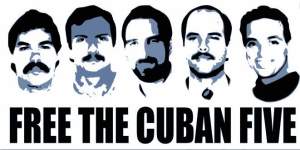
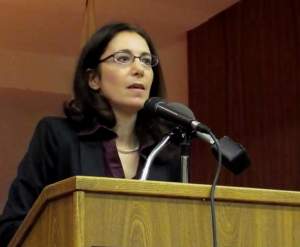
Cuba In The News, The Cuban Five and Exposing Journalists For Hire
Lately, Cuba and its relationship to the United States has been in the news. The New York Times alone had 4 editorials on Cuba. Several urged the reestablishment of diplomatic relations with Cuba which were severed more than 50 years ago. Another urged the prisoner exchange of the Cuban Five now 3, and Alan Gross, the American who has been in a Cuban prison for several years. Last year attorneys with the Partnership for the Civil Justice Fund filed a Freedom of Information Action lawsuit against the U.S. State Department for its refusal to produce responsive materials in its possession about secret payments by the U.S. government to Miami-based journalists who were “reporting” on the Cuban Five case before and during the trial and while the jury deliberated.
Attorney Mara Verheyden-Hilliard:
- The Cuban Five, are five Cuban men who came into the United States to basically learn what the terrorists in Miami were planning. Cuba is a country that has been subject to terrorist attacks for decade after decade.
- There have been bombings, planes shot down. A huge amount of death and destruction but it comes out of the United States from anti-Castro in Miami who are reeking terror on the people of Cuba.
- The U.S government has never taken action to stop these terror attacks that emanate from their shores. In fact the CIA has had been known to have at least some of these people on their payroll or working with them over the years.
- Ultimately, they (Cuban Five) uncovered information which was shared with the FBI, from the Cuban government to the FBI. What happened was the terrorists weren’t arrested, these men were arrested.
- They were charged with espionage offenses, put on trial and found guilty.
- The issue is . . they were tried in Miami, they were tried in this heated environment, tried in conditions that there was no way they could have gotten a fair trial. An issue that has been repeated over and over again in the years of appeals.
- What has been uncovered more recently is that the U.S. government had journalists on their payroll who were presenting themselves as independent journalists in Miami who filled the airwaves and newspapers with extremely hostile and inflammatory coverage of Cuba as well as the trial itself.
- There’s no way this couldn’t have had an impact, on the jury, on the jury pool, on the sitting jury.
- The U.S. government itself is prohibited by the Smith-Mundt Act of 1948 from funding activities to influence and propagandize public opinion.
- We live in a country where we’re free to be wire-tapped, spied on, to have the FBI infiltrating religious institutions and monitoring peaceful protests.
- Prisoner exchange: The fact is the Cuban Five were not attempting to undercut or destabilize the U.S. government. They were simply trying to get information about terrorist attacks emanating from the United States, hurting the people of their country. Alan Gross on the other hand was sent as part of a covert U.S. government operation into Cuba multiple times to material, satellites, phones, communication material, in an attempt to destabilize and over throw the Cuban government.
- We have fought for years with Freedom of Information Act demands and working in partnership with the National Committee to Free the Cuban Five and Gloria LaRiva who has led that organization. She is the key person in the National Committee to Free the Cuban Five that raised this issue, that spent a huge amount of time, going through records, going through the records, audio and visual of the different media, television and radio – and linking these together and doing research into these journalists and establishing what appeared to be this covert operation.
- Much of that material is up on a website called ReportersForHire.org
- Because the State Department was clearly holding material within a certain time period and had not searched their records at all for the material we demanded, we filed a lawsuit in Federal court, and that’s a lawsuit we’re still in the process of litigating.
- The issue of the blockade, which on its face, starving a population to try and force them to change their government is really criminal and a violation of international law.
- Standing on its own without the U.S. blockade, Cuba would thrive.
- Cuba is still there and has withstood and been strong through all of this.
- By lifting the blockade and allowing the U.S. to penetrate into Cuba with American capitalism would be another way of attempting to over throw the government of Cuba.
- A major major funding stream for these groups and these entities in Miami who are working against the people of Cuba and against the government of Cuba.
- US Army Col Lawrence Wilkerson Letter To Obama.
Guest – Mara Verheyden-Hilliard, co-chair of the Guild’s National Mass Defense Committee. co-founder of the Partnership for Civil Justice Fund in Washington, DC, she secured $13.7 million for about 700 of the 2000 IMF/World Bank protesters in Becker, et al. v. District of Columbia, et al., while also winning pledges from the District to improve police training about First Amendment issues. She won $8.25 million for approximately 400 class members in Barham, et al. v. Ramsey, et al. (alleging false arrest at the 2002 IMF/World Bank protests). She served as lead counsel in Mills, et al v. District of Columbia (obtaining a ruling that D.C.’s seizure and interrogation police checkpoint program was unconstitutional); in Bolger, et al. v. District of Columbia (involving targeting of political activists and false arrest by law enforcement based on political affiliation); and in National Council of Arab Americans, et al. v. City of New York, et al. (successfully challenging the city’s efforts to discriminatorily restrict mass assembly in Central Park’s Great Lawn stemming from the 2004 RNC protests.)
——

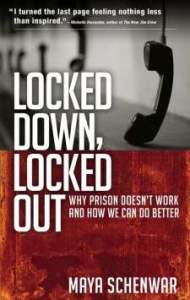
Locked Down, Locked Out: Why Prison Doesn’t Work and How We Can Do Better
In this country there are 2.3 million Americans locked up in prison, and 95 percent of prisoners that are released emerge with very little opportunity to rebuild their lives. Our guest journalist Maya Schenwar has written about the social destruction of the prison industry and the community based initiatives to help former inmates in her book Locked Down, Locked Out: Why Prison Doesn’t Work and How We Can Do Better. Locked Down, Locked Out begins by examining the fundamental crisis of how prison breaks apart families and communities. These experiences relay the enormous damage caused by severing millions of people from family and community ties. In exploring alternatives to incarceration Maya suggests ways to provide resolution to victims while repairing communities of color.
Maya Schenwar:
- It started about ten years ago which was when my sister went to juvenile.
- I had been corresponding with someone on death row, and I had an inclination to write about this issue at the time was really on the margins of journalism.
- When my sister went to juvenile detention and I went to visit her I was immediately struck by the fact that this detention center was a jail.
- Fourteen year olds were being locked up.
- You’re taking people who have already been traumatized and putting them in the most isolating conditions, separating them from society in this way that can’t help create further trauma.
- Prison just doesn’t work. About 2/3 of people who are released from prison are re-arrested in 3 years.
- Instead of talking about the law, we’re going to be talking about the harm that was done to you. A very different thing.
- There needs to be a victim centric approach, something that takes the victim’s healing into consideration.
- Sometimes it gets lost in the conversation about mass incarceration that every single person occupying a prison is a human being and therefore has a constellation of connections with people on the outside when they go in.
- Prison becomes this process of breaking each of those links.
- When you’re communicating with a person in prison, you can’t call them they have to call you. You have no idea when they’ll be able to call you.
- Letters become the only reliable form of communication.
- It comes down to the community level, it comes down to erasing this idea we have that there is a one size fits all solution.
- So many of those problems stem from things we’re depriving people of in our society like housing, food, shelter. We have to think about providing those things as part of creating a society with less harm and less violence.
Guest – Maya Schenwar, is Truthout’s Editor-in-Chief. Her book, Locked Down, Locked Out: Why Prison Doesn’t Work and How We Can Do Better, Berrett-Koehler Publishers. Previously, she was a senior editor and reporter at Truthout, writing on US defense policy, the criminal justice system, campaign politics, and immigration reform. Prior to her work at Truthout, Maya was contributing editor at Punk Planet magazine.
—————————————————————————————

Please help support Law and Disorder, the show is now a sponsored project of Fractured Atlas, a non-profit arts service organization. Contributions for the charitable purposes of Law and Disorder must be made payable to Fractured Atlas only and are tax-deductible to the extent permitted by law.
Afghanistan War, CIA Sponsored Terror, Civil Liberties, Criminalizing Dissent, Habeas Corpus, Human Rights, Iraq War, NSA Spying, Political Prisoner, Prison Industry, Surveillance, Targeting Muslims, Torture, Truth to Power, War Resister
Podcast: Play in new window | Download
Updates
- Michael Ratner Reports On An Important Break In The Julian Assange Case
- Michael Ratner: Longest Case Of Pre-Trial Investigation In Swedish History In Which The Prosecutor Has Simply Sat On Her Hands.
- Michael Ratner: What Sweden Did Here Is Divert Attention From The Underlying Problem
- Michael Smith: United Nations And The Cuban Embargo Vote 2014
- Michael Ratner: Israeli Business Men Are All Over Cuba
——-

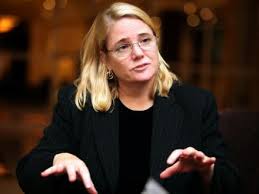
Blackwater Guards Found Guilty in 2007 Baghdad Killings
Since 2003, private military contractors have been awarded millions of dollars each year by the U.S. Government in contracts. Many of the military contractor personnel have engaged in atrocious war crimes with zero accountability. Last week a federal jury convicted 4 former Blackwater private security contractors on manslaughter charges and 1 for manslaughter and murder of 17 Iraqis in Baghdad on September 16, 2007. The men were prosecuted under the Military Extraterritorial Jurisdiction Act, a law that allows the U.S. courts to hear cases against contractors to the U.S. Department of Defense for crimes committed overseas. The men were originally hired as private security guards for U.S government employees. Lawyers for Blackwater, now known as Academi LLC argued that the men were simply returning fire to protect themselves.Several civil cases filed by victims injured in the shootings were settled in 2010.
Attorney Susan Burke:
- I think the verdict sends a very loud and large message to the globe that the American judicial system can operate properly.
- That American juries understand when they see war crimes, they understand when they hear about a massacre.
- We began working before the Abu-Ghraib photos were leaked. It began when Bob Woodward wrote a story for the Washington Post that revealed that the Bush Administration had decided to use torture as an instrument in the war.
- We viewed this outsourcing as a potential weak flank in a sense in order to use legal mechanisms, lawsuits in order to prevent this country from departing with its values.
- We were putting the evidence together before the photos leaked and suddenly we had a lot more evidence to sue the 2 government contractors L3 and CACI that were involved in the Abu-Ghraib torture.
- The Blackwater case fits into that rubrick where we brought several different law suits along with the Center for Constitutional Rights. We brought the seven law suits for the victims of the Nisour Square massacre as well as for many other victims.
- If you think about we’re going to the home turf of the wrong doers. The corporations are based in Virginia actually, and so we sued them in their home turf.
- There’s one (civil) case remaining that’s now being handled by Baher Azmy at CCR and they just got a win from the Fourth Circuit – again getting permission for the case to proceed.
- The vast majority of victims have settled with L3 paying 5.25 million.
- Blackwater is a mercenary company that basically earned over a billion dollars from the State Department.
- They were not at Abu Ghraib rather they were providing security for all of the diplomats and other Americans in Iraq.
- At the time they were owned by Erik Prince, operated without any oversight from the State Department and they were involved with a significant number of instances were unnecessary and excessive force was used.
- Erik Prince ended up entering into a settlement and all of those folks obtained compensation.
- Prince then sold the company, retained a revenue stream but the company became Academi.
- As a nation we continue to use these mercenaries and we continue to lack any regulation or oversight. Unfortunately, things didn’t change under the Obama Administration and under Secretary Clinton at the State Department
- What’s happened is there’s this terrible pattern where these companies have a lot of political influence and they continue to get enormous contracts and the State Department continues to outsource security without have a vibrant, or robust oversight function.
- Blackwater vehicles rolled into Nisour Square and they began to open fire with heavy automatic weaponry and they simply began to spray indiscriminatly. They began to shoot all over Nisour Square killing people nearby and injuring people as they fled. No provocation, no real reason they began shooting.
- One of the Blackwater men, a man named Jeremy Ridgeway actually stepped and told the truth early on, pled guilty and explained how this was in fact just indiscriminate shooting for no reason.
- In order to properly handle these matters I ended up creating my own firm.
Guest – Attorney Susan Burke, represented plaintiffs in those civil cases and she joins us today to talk about criminal case, the sentence and the supporting evidence.
——
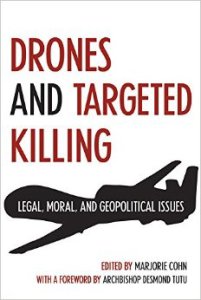

Drones and Targeted Killing: Legal, Moral and Geopolitical Issues
A powerful analysis on the use of drones for targeted assassination by the Obama Administration is explored in Professor Marjorie Cohn’s newly published book titled Drones and Targeted Killing: Legal, Moral, and Geopolitical Issues. It’s a collection of various disciplines including sociologists, legal scholars, and human rights activists that examine aspects of the U.S. policy of targeted killings with drones and other methods. The book documents civilian casualties, and discuses the first U.S. targeted killing lawsuit by the lawyer who brought the case.
Attorney Marjorie Cohn:
- Drones have become the Obama Administration’s preferred weapon of choice.
- We rarely see images of the victims of drone strikes the overwhelming majority of whom are civilians.
- We don’t hear their stories because the media sanitizes their stories.
- We really don’t have a sense of the devastation that is reeked by drones.
- I thought it was important to put together a collection of different aspects of this drone policy. Is it legal? Is it moral? What are the political ramifications? Does it make us safer? Does it make us less safe?
- That Authorization for the Use of Military Force was very limited, it was only limited to groups and countries that supported the 911 attacks and Congress specifically rejected the Bush Administrations request for open ended military authority to deter and preempt any future acts of terrorism against the United States – and yet the Obama Administration has been relying on this as its legal authority.
- Targeted extrajudicial killings off the battle field are illegal.
- Richard Falk, the U.N. Special Rapporteur to the Palestinian Occupied Territories wrote a very and interesting and provocative chapter called Why Drones Are More Dangerous Than Nuclear Weapons.
- Medea Benjamin talked about stories of victims in Pakistan and Yemen and the tolls drones take on communities. The horror, the terror that children are sleeping with drones hovering overhead.
- Pardiss Kebriaei with the Center for Constitutional Rights that handled the first targeted killing case in the United States writes a chapter.
- Tom Hayden writes the conclusion about stopping the drones.
- Phyllis Bennis from the Institute of Policy Studies talks about the assassination as essential to the U.S. war strategy due to the militarization of our foreign policy.
- John Quigley from Ohio State University talks about the blowback from drones and how they actually make us less safe because when people see their families blown up, they resent the United States even more.
- He talks about the history of U.S. foreign policy and the resentment its caused in those countries against the United States.
- He (Barack Obama) has even expanded the use of drones in Iraq and Syria. He’s also using piloted aircraft. He’s also using the AUMF which does not apply at all.
- This ISIS and Khorasan, the current groups doing horrible things over there are not covered by the Authorization for the Use Of Military Force.
- He’s actually acting beyond what Congress has authorized to say nothing of it violating the U.N. charter.
- Only 4 percent of victims in Pakistan were members or even associated with Al-Qaeda which means the overwhelming number of 2400 who have been killed in Pakistan by drone strikes are civilians.
- The FAA Modernization and Reform Act of 2012 requires the FAA to integrate into U.S. airspace by September of 2015 to legalize commercial drones and some government agencies to use small drones. This is very very worrisome because of the privacy considerations primarily.
- There are two different drone strikes the U.S. carries out. One is called personality strikes, where they target suspected bad guys. They call them militants. That could mean anything.
- No due process, just take em out.
- The other type of attack is called signature strikes. That is a strike that is carried out in an area of suspicious activity. If you’re a male between the ages of 16-65 in a area of suspicious activity than you’re fair game, even though the Obama Administration doesn’t know your identity.
- First, there must be a legal basis for using lethal force, whether it is against a senior operational leader of a terrorist organization or the forces that organization is using or intends to use to conduct terrorist attacks.
- Second, the United States will use lethal force only against a target that poses a continuing, imminent threat to U.S. persons. It is simply not the case that all terrorists pose a continuing, imminent threat to U.S. persons; if a terrorist does not pose such a threat, the United States will not use lethal force.
- Third, the following criteria must be met before lethal action may be taken:
- Near certainty that the terrorist target is present;
- Near certainty that non-combatants will not be injured or killed;
- An assessment that capture is not feasible at the time of the operation;
- An assessment that the relevant governmental authorities in the country where action is contemplated cannot or will not effectively address the threat to U.S. persons; andAn assessment that no other reasonable alternatives exist to effectively address the threat to U.S. persons.
- Finally, whenever the United States uses force in foreign territories, international legal principles, including respect for sovereignty and the law of armed conflict, impose important constraints on the ability of the United States to act unilaterally – and on the way in which the United States can use force. The United States respects national sovereignty and international law.
Guest – Attorney Marjorie Cohn former president of the National Lawyers Guild. She lectures throughout the world on international human rights and U.S. foreign policy. A news consultant for CBS News and a legal analyst for Court TV, she also provides legal and political commentary on BBC, CNN, MSNBC, Fox News, NPR, Air America and Pacifica Radio. In addition, Professor Cohn is the author of Cowboy Republic: Six Ways the Bush Gang Has Defied the Law and co-author of Cameras in the Courtroom: Television and the Pursuit of Justice and Rules of Disengagement: The Politics and Honor of Military Dissent. Her latest book, The United States and Torture: Interrogation, Incarceration and Abuse, was published in January 2011 by NYU Press.
—————————————————————–
Afghanistan War, Civil Liberties, Criminalizing Dissent, FBI Intrusion, Gaza, Habeas Corpus, Human Rights, Iraq War, Political Prisoner, Prison Industry, Surveillance, Targeting Muslims, Torture, Truth to Power
Podcast: Play in new window | Download
Updates:
- Michael Ratner: Obama Could Allow “Torture Light” Interpretation of U.N. Treaty on Torture
- Michael Smith Returns From Argentina Book Tour, Describes How U.S Attempts To Destabilize Argentina Economy
——-

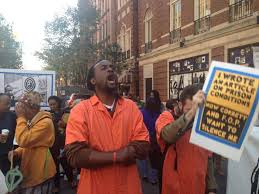
The Revictimization Relief Act (Muzzle Mumia)
Last Thursday, the Pennsylvania State Senate in a bi-partisan 37-11 vote, approved The Revictimization Release Act. This last minute controversial law was ignited by Mumia Abu Jamal’s commencement address delivered at Goddard College in Vermont. The law would grant crime victims or prosecutors acting on their behalf to file a civil action against an offender to seek injunctive relief to stop offenders or former inmates from engaging in conduct that would cause “temporary or permanent state of mental anguish” to the victim.
Mumia Abu Jamal is 60 years old. He’s in the general population at Mahanoy State Correctional Institution in Frackville. He has also given speeches at Evergreen State College in Washington and Antioch College in Ohio.
Attorney Bret Grote:
- The Muzzle Mumia Law as it was called by the Harrisburg Patriot provides a cause of action for a victim of a personal injury crime to sue an offender in state court in Pennsylvania if that offender engages in conduct that “perpetuates” the effect of that crime on the victim. Later on in the statutes, that conduct is defined as including conduct that a temporary or permanent states of mental anguish.
- It also provides for the district attorney where the conviction was secured or the state’s attorney general to essentially act as the private attorney for the victim in order to bring this suit.
- It also does encompass not only speech about the crime whether its somebody like Mumia or Lorenzo Johnson or countless others who speak out about being framed up in Pennsylvania, but it doesn’t even make any exceptions for legal proceedings – and obviously people appealing criminal convictions can cause anguish to others.
- There are standards and no definitions for the conduct that is at issue except in relation to its impact on the victim and to provide some context as I’m sure your listeners know why it was written this way is they needed to write a statute that would sweep so broadly so as to encompass things like Mumia giving a commencement address at Goddard College, which was used as a pretext for whipping up this frenzy at the state legislature.
- It is a prior restraint on the freedom of speech but its written so broadly that Maureen Faulkner or the district attorney could conceivably go into court under this law.
- The House Judiciary committee in discussing this law when it was introduced in committee raised the issue of would this allow a court to enjoin what they called third party vessels.
- It could be Prison Radio, or it could be an individual who is authorized to speak to the media, or make a public statement.
- It was passed 197-0 in the House Legislature, and 37-11 in the Senate.
- It just shows you what takes precedence over any kind of adherence of the Constitution of the state or the United States, more than any law is allegiance to power amongst the political class, Pennsylvania politicians, attorney generals, district attorneys, are no strangers to Constitutional violations, its a normative practice for them.
- Right now, I’m representing Mumia in this and Prison Radio and Robert Holbrook who is a juvenile lifer and Human Rights Coalition member and activist and writer.
- Its unconstitutional under traditional over breadth analysis, it penalized lawful speech and its void for vagueness.
- There is probably nothing that would be more traumatizing for an actual victim of a crime then to have to go through this process that they’ve laid out in the Revictimization Release Act.
- They explicitly and exclusively focused on Mumia.
- This legislation was introduced by a former member of the Fraternal Order of Police, Mike Verib, who was a former Philadelphia police officer now a state legislator. In the context of Mumia’s case they have been leading a lynch mob literally in the streets to snuff out his voice.
- For decades the judge that presided over his trial was a Fraternal Order of Police member. They finance and vet the campaigns of every Supreme Court Justice in the state of Pennsylvania, the same with people running for office as governors.
- Mumia is being used in this context to reestablish the narrative, the Fraternal Order of Police, the police, their political counterparts are righteous protectors of public safety and that they’re beyond question and beyond reproach in trying to reset the propaganda line that has been dislodged in the wake of the rebellions in Ferguson, Illinois.
Guest – Pennsylvania attorney Brete Grote, a member of the Russell Maroon Shoatz legal team and cofounder and legal director of the Abolitionist Law Center. Bret has worked with the Human Rights Coalition since 2007 as an investigator, organizer, and researcher. He was the Isabel and Alger Hiss Racial Justice Fellow at the Center for Constitutional Rights in 2012. He graduated from the University of Pitt Law School in May 2013 and was recognized as the school’s Distinguished Public Interest Scholar.
——-

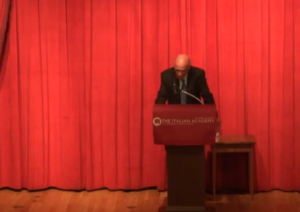
Richard Falk: The Palestinian Future After Gaza
We hear a presentation by Richard Falk titled The Palestinian Future After Gaza. Richard Falk was presenting at the Edward W. Said Memorial Lecture, co-sponsored by Columbia’s Heyman Center for the Humanities. It’s given once a year in honor of the public intellectual and literary critic, Edward W. Said, who taught in the English & Comparative Literature Department at Columbia from 1963 until 2003
Richard Falk is Albert G. Professor of International Law and Practice Emeritus at Princeton where he was a member of the faculty for 40 years. Since 2002 he has been associated with Global & International Studies at University of California, Santa Barbara as a research professor.
He was Special Rapporteur on Occupied Palestine for the UN Human Rights Council since 2008, and served on a panel of experts appointed by the President of the UN General Assembly, 2008-2009. He is Chair of the Board of Directors, Nuclear Age Peace Foundation, an NGO located in Santa Barbara.
He is also a member of the editorial board of several journals and magazines, including the American Journal of International Law, Third World Quarterly, Globalizations, The Nation, and The Progressive. Formerly, he was for many years North American Director of the World Order Models Project.
————————————————————————–
Afghanistan War, CIA Sponsored Terror, Civil Liberties, Criminalizing Dissent, Gaza, Guantanamo, Habeas Corpus, Human Rights, Iraq War, NSA Spying, Political Prisoner, Prison Industry, Surveillance, Targeting Muslims, Torture, Truth to Power, War Resister
Podcast: Play in new window | Download
Updates:
- Mumia Spurs Bill To Block Publicity-Seeking Criminals (Son of Sam Law)
- Guantanamo Bay Prisoner Files Historic Lawsuit Against Obama Over Force-Feeding
——

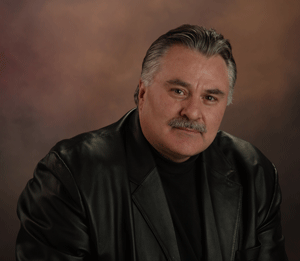
Lawyers You’ll Like – Charlie Abourezk
As part of our Lawyers You’ll Like series, we talk with attorney Charles Abourezk about his work with the Native American community in South Dakota. Charles is a trial attorney, author and film maker. His documentary A Tattoo On My Heart: The Warriors of Wounded Knee 1973 is a gripping documentation of those American Indian men and women involved in the siege. Charles is the Chief Justice of the Rosebud Sioux Tribe Supreme Court, he’s also member of South Dakota Advisory Committee to U.S. Commission on Civil Rights. He’s the son of James George Abourezk, former Democratic United States Representative and United States Senator where he was generally viewed as critical of US foreign policy in Israel and Palestinian.
Attorney Charlie Abourezk:
- The Rosebud Sioux Tribe is the second largest tribe in South Dakota. There are nine total tribal governments in the state. It’s where I grew up.
- I spent most of my adult life on the Pine Ridge Reservation which has been the poorest county in the United States.
- I went to law school, long after I worked for a number of Indian organizations including a Native American NGO that worked at the UN in Category 2 status.
- The Pine Ridge Reservation is the second largest reservation in the United States, located in south western South Dakota. It’s a huge land mass, takes about an hour and a half to drive diagonally across the reservation. There’s very little economy. The geography is very poor, it lends itself to cattle grazing but not much in terms of raising crops.
- Wounded Knee was the site of the 1890 massacre in which almost 300 American Indians from several different tribes were killed by the U.S. Army. They were surrounded and essentially murdered on that spot.
- So, in 1973, there had been a lot of racial discrimination and racially motivated killings of Indian people, the American Indian Movement returned and joined forces with the traditional people who had long been neglected on the reservation.
- As a result they decided to engage in a protest. They chose the site of the massacre at Wounded Knee, to stage that protest.
- They set up sort of a line there, with the government and US Marshalls, along with Dick Wilson’s followers who were armed and were called the goon squad and formed the other side of that line. The siege lasted 71 days.
- It finally dismantled and number of people were prosecuted as a result of that.
- At Wounded Knee, two Indian people killed and one Marshall wounded.
- We set up a recording studio right at the Wounded Knee school, and just took people’s stories. I did the interviews, they were really powerful. There were some stories that didn’t fit with the arc of the film but were incredible. I’m glad I documented it then, because I think of the people in the documentary, 7 or 8 have now passed away.
- I continue to be a strong advocate for tribal sovereignty, self determination and the rights of individuals especially within the dynamic of racial discrimination which at times in South Dakota have been as bad as the south is toward African Americans.
- I helped affirm and preserve the boundaries of the Yankton Sioux Reservation, that went up to the Supreme Court twice. I was the lead council when it finally concluded, we were able to win that one.
- I was a former Supreme Court Justice on the Pine Ridge Reservation for their Supreme Court and I retired from that position.
- Except for limited jurisdiction the Federal Government had on criminal matters, the civil jurisdiction for incidents which occur within the reservation lie with the tribal court as do criminal misdemeanors for tribal members and non tribal members meaning Indians from other tribes that happen to be living on the reservation.
- In the Native American view you can’t really have winners and losers, you have to try to restore the harmony or the balance within the tribe.
- The American government adopted the British style of colonialism as did the Israelis when they began to colonize parts of Palestine. It kind of goes in 4 steps.
- A disruption of traditional agriculture and food gathering, which out here was done in two ways, killing off the buffalo and secondly constraining them from moving around in a wide arc for hunting and gathering – by putting them on the reservation they stopped that.
- Transfer commonly owned land into private ownership, to turn land into a commodity that can be bought and sold. They did that through what’s called the Daws Act or the Allotment Act in the late 1800s.
- Theodore Roosevelt called that act a “might pulverizing machine” with which to break up the tribal mass.
- The third step was to develop a native ruling elite. In this case they first developed “paper chiefs” then in the 1930s developed modern tribal government.
- Last step, develop an educated elite. Of course any colonizer anywhere, that’s the step that always back fires.
- The American Indian Movement was born from the children of the parents who were relocated into cities trained as workers.
- They were the ones who came back home and joined forces with the traditional people and stood up against racism and in favor of tribal sovereignty and tribal self determination.
- You see many parallels with that and what’s happening to the Palestinians in the West Bank and Gaza. Dr William Julius Wilson
Guest – Charlie Abourezk, from Rapid City, South Dakota and is a trial attorney, longtime activist and community organizer in the native American community in South Dakota. He is also a documentary film maker, his most recent is the feature length documentary “A Tattoo On My Heart: The Warriors of Wounded Knee 1973” which played on public television stations around the United States. He is the current Chief Justice of the Rosebud Sioux Tribe’s Supreme Court and a member of the South Dakota Advisory Committee to the US Commission on Civil Rights. His client base is made up largely of Native Americans, tribal schools and Indian tribal governments, but he also represents plaintiffs in civil rights litigation. He will have a book coming out this next year entitled “A Mighty Pulverizing Machine: The Continuing Colonization of American Indians.”
——-
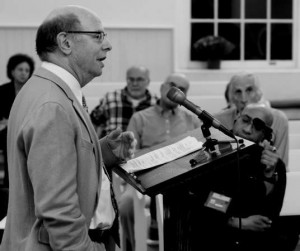
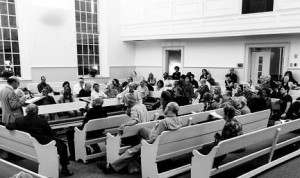
From Guantanamo to Wikileaks: Taking on the State In a Post 9/11 World.
Our own Michael Ratner, President Emeritus, Center for Constitutional Rights (CCR), past president, National Lawyers Guild; Chair, European Center for Constitutional and Human Rights delivered a talk last week titled ‘From Guantanamo to Wikileaks: Taking on the State In a Post 9/11 World.’ Michael was honored with a PathMaker to Peace Award by the Brooklyn For Peace Organization for his consistent work in litigation against government spying and surveillance of activists including the targeting of Muslims particularly after 9/11.
Law and Disorder Co-host Attorney Michael Ratner, President Emeritus of the Center for Constitutional Rights (CCR), a non-profit human rights litigation organization based in New York City and president of the European Center for Constitutional and Human Rights (ECCHR) based in Berlin. Ratner and CCR are currently the attorneys in the United States for publishers Julian Assange and Wikileaks. He was co-counsel in representing the Guantanamo Bay detainees in the United States Supreme Court, where, in June 2004, the court decided his clients have the right to test the legality of their detentions in court. Ratner is also a past president of the National Lawyers Guild and the author of numerous books and articles, including the books Who Killed Che? How the CIA Got Away With Murder, The Trial of Donald Rumsfeld: A Prosecution by Book, Against War with Iraq and Guantanamo: What the World Should Know, as well as a textbook on international human rights.
———————————————————————————-

Please help support Law and Disorder, the show is now a sponsored project of Fractured Atlas, a non-profit arts service organization. Contributions for the charitable purposes of Law and Disorder must be made payable to Fractured Atlas only and are tax-deductible to the extent permitted by law.

























